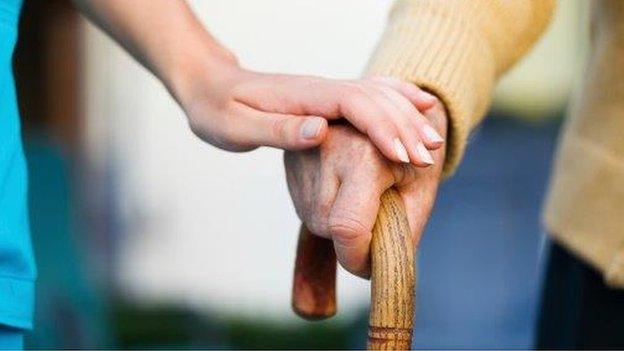National Living Wage will 'damage care homes'
- Published

Health and care is integrated in Northern Ireland, unlike the rest of the UK
The National Living Wage could result in a "catastrophic collapse" in the number of care homes, according to the five biggest providers.
In a letter to the chancellor, they say staffing accounts for 60% of the cost of care.
The companies said they supported the National Living Wage, but efforts would be needed to rescue the care system.
The government said social care would be considered as part of the spending review later this year.
Under plans announced in the Budget, workers aged over 25 in the UK will be paid a minimum of £7.20 an hour from April next year, rising to £9 by 2020.
Four Seasons Health Care, Bupa, HC-One, Care UK and Barchester said the measure would cost the care sector £1bn by 2020.
They warned any shortage of care places could put huge pressure on the NHS.
Martin Green, the chief executive of Care England which represents the industry, said: "Without adequate funding to pay for the National Living Wage, the care sector is at serious risk of catastrophic collapse."
He said there was a "grave and very real possibility" that a provider could fail within the next two years.
Mr Green added: "We want to work with the government to find a fair solution that will ensure the care sector can provide a safe and comfortable environment for older people who live in care homes."
The UK Homecare Association made a similar warning last month, saying services to care for people in their own homes would become "unviable".
A government spokesman said: "The National Living Wage will benefit hundreds of thousands of care workers who will see their pay increase.
"The overall costs of providing social care will be considered as part of the spending review later this year and we are working with the care sector to understand how the changes will affect them."
- Published27 July 2015

- Published28 July 2015

- Published14 September 2016
